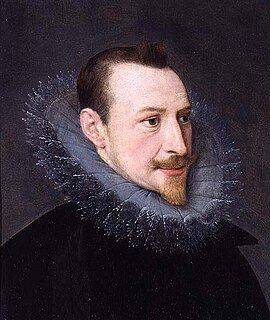
Edmund Spenser was an English poet best known for The Faerie Queene, an epic poem and fantastical allegory celebrating the Tudor dynasty and Elizabeth I. He is recognized as one of the premier craftsmen of nascent Modern English verse, and is often considered one of the greatest poets in the English language.

Homer is the presumed author of the Iliad and the Odyssey, two epic poems that are the foundational works of ancient Greek literature. The Iliad is set during the Trojan War, the ten-year siege of the city of Troy by a coalition of Greek kingdoms. It focuses on a quarrel between King Agamemnon and the warrior Achilles lasting a few weeks during the last year of the war. The Odyssey focuses on the ten-year journey home of Odysseus, king of Ithaca, after the fall of Troy. Many accounts of Homer's life circulated in classical antiquity, the most widespread being that he was a blind bard from Ionia, a region of central coastal Anatolia in present-day Turkey. Modern scholars consider these accounts legendary.
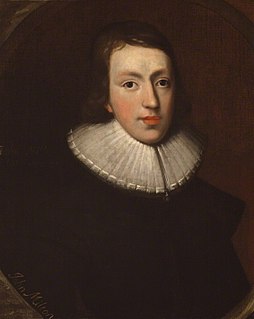
John Milton was an English poet and intellectual who served as a civil servant for the Commonwealth of England under its Council of State and later under Oliver Cromwell. He wrote at a time of religious flux and political upheaval, and is best known for his epic poem Paradise Lost (1667), written in blank verse, and widely considered to be one of the greatest works of literature ever written.

Paradise Lost is an epic poem in blank verse by the 17th-century English poet John Milton (1608–1674). The first version, published in 1667, consists of ten books with over ten thousand lines of verse. A second edition followed in 1674, arranged into twelve books with minor revisions throughout. It is considered to be Milton's major work, and it helped solidify his reputation as one of the greatest English poets of his time. The poem concerns the biblical story of the Fall of Man: the temptation of Adam and Eve by the fallen angel Satan and their expulsion from the Garden of Eden. Milton's purpose, as stated in Book I, is to "justify the ways of God to men."
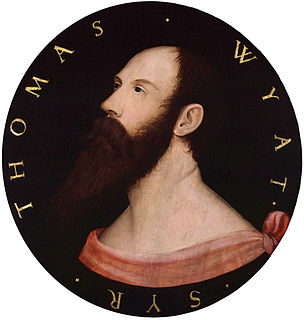
Sir Thomas Wyatt was a 16th-century English politician, ambassador, and lyric poet credited with introducing the sonnet to English literature. He was born at Allington Castle near Maidstone in Kent, though the family was originally from Yorkshire. His family adopted the Lancastrian side in the Wars of Roses. His mother was Anne Skinner, and his father Henry had been a Privy Councillor of Henry VII and remained a trusted adviser when Henry VIII ascended the throne in 1509. Thomas followed his father to court after his education at St John's College, Cambridge. Entering the King's service, he was entrusted with many important diplomatic missions. In public life his principal patron was Thomas Cromwell, after whose death he was recalled from abroad and imprisoned (1541). Though subsequently acquitted and released, shortly thereafter he died. His poems were circulated at court and may have been published anonymously in the anthology The Court of Venus during his lifetime, but were not published under his name until after his death; the first major book to feature and attribute his verse was Tottel's Miscellany (1557), printed 15 years after his death.

Robert Dodsley was an English bookseller, poet, playwright, and miscellaneous writer.
Nicholas Grimald (1519–1562) was an English poet and dramatist.
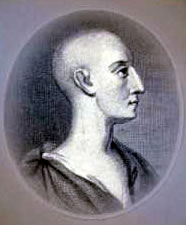
Ambrose Philips was an English poet and politician.
Thomas Rymer was an English poet, critic, antiquary and historian. His most lasting contribution was to compile and publish 16 volumes of the first edition of Foedera, a work in 20 volumes containing agreements made between The Crown of England and foreign powers since 1101. He held the office of English Historiographer Royal from 1692 to 1714. He is credited with coining the phrase "poetic justice" in his book The Tragedies of the Last Age Consider'd (1678).
Songes and Sonettes, usually called Tottel's Miscellany, was the first printed anthology of English poetry. First published by Richard Tottel in 1557 in London, it ran to many editions in the sixteenth century.
John Norris, sometimes called John Norris of Bemerton (1657–1712), was an English theologian, philosopher and poet associated with the Cambridge Platonists.
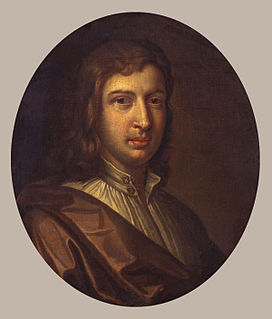
John Philips was an 18th-century English poet.
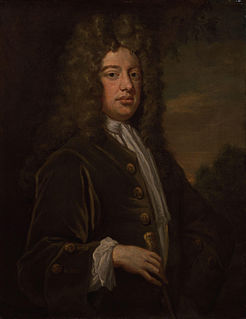
William Walsh of Abberley Hall, Worcestershire was an English poet and critic and a Whig politician who sat in the English and British House of Commons from 1698 to 1708.

Milton's 1645 Poems is a collection, divided into separate English and Latin sections, of John Milton's youthful poetry in a variety of genres, including such notable works as An Ode on the Morning of Christ's Nativity, Comus and Lycidas. Appearing in late 1645 or 1646, the octavo volume, whose full title is Poems of Mr. John Milton both English and Latin, compos'd at several times, was issued by the Royalist publisher Humphrey Moseley. In 1673, a year before his death, Milton issued a revised and expanded edition of the Poems.
Nationality words link to articles with information on the nation's poetry or literature.
Nationality words link to articles with information on the nation's poetry or literature.
Nationality words link to articles with information on the nation's poetry or literature.
The Seasons is a series of four poems written by the Scottish author James Thomson. The first part, Winter, was published in 1726, and the completed poem cycle appeared in 1730.
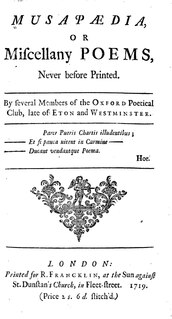
A miscellany is a collection of various pieces of writing by different authors. Meaning a mixture, medley, or assortment, a miscellany can include pieces on many subjects and in a variety of different forms. In contrast to anthologies, whose aim is to give a selective and canonical view of literature, miscellanies were produced for the entertainment of a contemporary audience and so instead emphasise collectiveness and popularity. Laura Mandell and Rita Raley state:
This last distinction is quite often visible in the basic categorical differences between anthologies on the one hand, and all other types of collections on the other, for it is in the one that we read poems of excellence, the "best of English poetry," and it is in the other that we read poems of interest. Out of the differences between a principle of selection and a principle of collection, then, comes a difference in aesthetic value, which is precisely what is at issue in the debates over the "proper" material for inclusion into the canon.

Constable's Miscellany was a part publishing serial established by Archibald Constable. Three numbers made up a volume; many of the works were divided into several volumes. The price of a number was one shilling. The full series title was Constable's Miscellany of Original and Selected Publications, in the Various Departments of Literature, Science, and the Arts.











